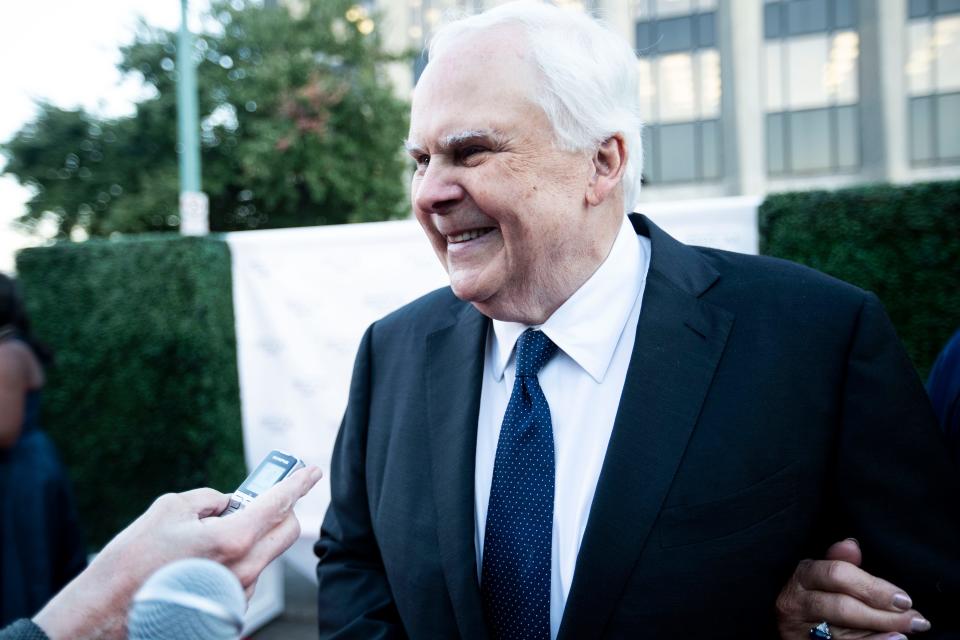Fred Smith flew in to rescue Memphis again. Will the state help stick landing? | Giannotto

Perhaps the most important statement now – now that FedEx founder Fred Smith made a record $50 million donation to try to end the great Memphis stadium debate – actually happened 43 days ago.
It was when Gov. Bill Lee made an appearance at the Agricenter. He was asked, on the day the Memphis City Council officially received $350 million in state money, about the developing civic brouhaha that had divided sports fans in the city over how that cash should be allocated between the University of Memphis and the Memphis Grizzlies.
“Sports venues around the state are really economic development opportunities. It’s what they are. They’re investments in jobs and economic development for our community,” Lee said on Oct. 10. “We’re always going to be looking at investing in economic development projects, including sports venues, in Memphis.”
Let’s all hope that means the state of Tennessee is interested in investing more.
That was the unspoken part Tuesday, which will undoubtedly be remembered as a great day for the University of Memphis.
Smith did what he has done for the city of Memphis for so long, injecting his own personal fortune to solve a problem. Just like he did more than 20 years ago when FedEx bought the naming rights to FedExForum to help facilitate the Grizzlies’ move to Memphis.
But there’s still more to do, and more money to procure, for this to be remembered as the deal that kept the Grizzlies here for another generation.
There remains a significant gap in the funding negotiations between the city and the team, despite the $50 million life raft Smith threw everyone involved.
Memphis is going to give the Grizzlies $230 million of that $350 million in state money. The Grizzlies, according to documents obtained by The Commercial Appeal in September, are seeking at least $550 million for FedExForum renovations. You don’t have to be good at math to know there’s money missing – perhaps hundreds of millions of dollars – from the equation.
The city and the Grizzlies are almost certainly headed back to Nashville when the new legislative session begins next year, in hopes of lobbying another batch of politicians to help Memphis finance the building in which its only major professional sports team plays.
Another cash infusion from the state would be the easiest solution . But “Hey Tennessee – $350 million wasn’t enough” might be a hard sell. In all likelihood, the city and the Grizzlies must convince state legislators to approve new tax revenue streams to fund the remainder of the project – some of which the state assembly rejected last year when Memphis got its $350 million.
It means the process of getting the money for FedExForum – and most importantly of all, a new 25-year lease for the Grizzlies to stay in Memphis – is likely to be a months-long endeavor, reliant on a legislative body that hasn’t regularly had the city’s best interests at heart.
If the state won’t provide that extra money, where will it come from? It’s an uncomfortable question to consider, and one that will be Mayor-elect Paul Young’s to figure out if this doesn’t go as everyone wants. That’s where Smith’s donation should give us faith that this will get figured out eventually. There are too many stakeholders who care deeply about the fortunes of the University of Memphis and the Grizzlies for this to fail.
Perhaps that’s too naïve to the realities of this state’s politics.
But now that Smith is involved, now that he’s so publicly invested in these projects, there should be a willingness on the state's part to open its purse strings again, in some form or another. There’s a reason House speaker Cameron Sexton came to Simmons Bank Liberty Stadium last November for the announcement that the USFL was returning to Memphis. It wasn’t because he was a big fan of the Showboats. It was because Smith had been the catalyst for the partnership.
Smith’s donation clears the way for the university to begin renovations on Simmons Bank Liberty Stadium following the AutoZone Liberty Bowl, a caveat that led Memphis president Bill Hardgrave and athletic director Laird Veatch to apply considerable public pressure in recent months. It also, hopefully, ends the awkward discourse pitting Tigers fans against Grizzlies fans.
Smith, in essence, is taking care of the Tigers' tab, so the focus can be squarely on making sure the Grizzlies' check gets paid.
But there are other questions to ponder, even from the university’s perspective.
Is a renovated stadium really the only thing holding Memphis back in conference realignment discussions?
If Memphis is to take over ownership of Simmons Bank Liberty Stadium from the city, which Veatch said was part of Smith’s proposal in order to donate the $50 million, can it afford to pay the long-term maintenance costs of a facility city council member Chase Carlisle called a “massive liability” Tuesday?
Can the athletic department fund raise $50 million to match Smith’s record donation when it took more than a decade to raise the $11.2 million needed to build an indoor practice facility for the football team?
GIANNOTTO: What's it like to watch a Memphis basketball game with Penny Hardaway? I found out
“It is a big challenge, no question,” Veatch said. "But with the lead gift from the Smith family … it just gives you the momentum and the credibility of that family in this community, getting behind this. That’s a huge piece.”
Let's all hope the lawmakers in Nashville heard that, too.
You can reach Commercial Appeal columnist Mark Giannotto via email at mgiannotto@gannett.com and follow him on X: @mgiannotto
This article originally appeared on Memphis Commercial Appeal: Fred Smith flew in to rescue Memphis. But what about the Grizzlies?


